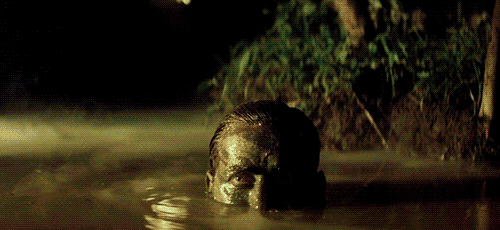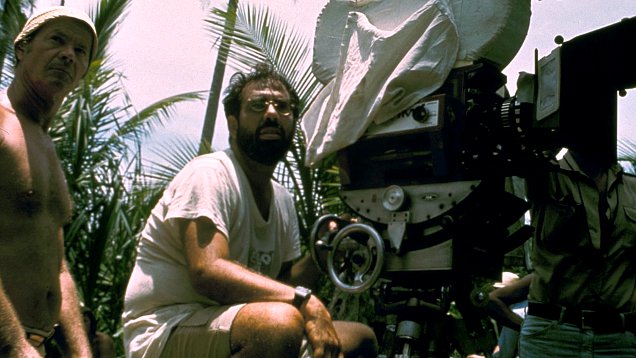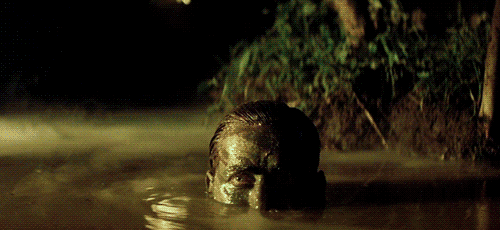Apocalypse Now: Final Cut is Francis Ford Coppola’s true war movie masterpiece

There are new moments in Apocalypse Now: Final Cut that are so phenomenal it boggles the mind that they were ever removed. Now in cinemas, the final version of this Vietnam War classic is a bona fide masterpiece, writes Sarah Ward.
Training its gaze at the Vietnam War, Apocalypse Now has always misted its lens with futility, pondering the pointlessness of its central battle. Inspired by Joseph Conrad’s Heart of Darkness, fruitlessness and senselessness streams through Francis Ford Coppola’s film, as thick, salty and constant as the sweat dripping from Captain Benjamin L. Willard’s (Martin Sheen) brow. The latter’s perspiration doesn’t stop amid the oppressive tropical climes, first in Vietnam and then Cambodia; nor does the certainty that such conflicts won’t ever cease.
In the movie’s evocative narration, Willard slowly gives voice to this thought. Charged with covertly dispensing with the once-decorated, now-disowned Colonel Walter E. Kurtz (Marlon Brando), the Captain travels along the Mekong River towards his task, the purposelessness and relentlessness of the combat around him heaping increasing weight on his musing mind along the way. As he witnesses a helicopter squadron acting like it’s the cavalry of old, children gunned down, napalm raining from the sky, fellow soldiers behaving boorishly – when they’re not needlessly losing their lives – and death lingering at every turn, Willard can’t see a reason for or envisage an end to the onslaught. He can’t convince himself that his target is as crazy as he’s been told, or worthy of death, especially as he begins to appreciate Kurtz’s controversial perspective.
Like his mark, Willard knows that the long-running war will never stop raging inside him, even once it is eventually, officially deemed over. Whether this infinite, immediate, end-of-days-esque ordeal can ever really come to a conclusion is a philosophical question, and one that echoes long after he stares Kurtz in the eye. For Apocalypse Now and Coppola, however, that query finally has an answer, all thanks to the film’s new Final Cut. As immortal as fictional figures always are, its characters will forever contemplate “the horror, the horror” of a war that’ll forever haunt the world, but the movie itself is no longer searching for its definitive version.
Allowing audiences to experience Apocalypse Now on the silver screen is never without merit; four decades after its first release, the film is as epic and immersive as it ever has been. Its now-signature touches – that vivid opening, juxtaposing a fiery bombing with Willard’s listlessness while Jim Morrison drawls out the iconic lyrics to ’The End’; Captain Kilgore’s (Robert Duvall) famous lines about surfing and napalm; the inimitable use of Wagner’s ‘Ride of the Valkyries’; Brando’s brooding performance – all remain potent and piercing, as well as electric and alive.
But with Apocalypse Now’s story unchanged in Final Cut, and the bulk of its content too, another question arises. After the Cannes Palme d’Or-winning version, the 1979 theatrical release, 2001’s Apocalypse Now Redux and a bootleg assembly edit, why has Coppola’s war epic received yet another interpretation?

With 2019 marking the feature’s 40th anniversary, it’s easy to see why Apocalypse Now has returned to screens in a commercial and commemorative sense. As for why Coppola has trifled with it again, it’d be easy to characterise the new version with the obvious response: because he could. Due to difficulty funding the movie (his plaudits for The Godfather, The Godfather: Part II and The Conversation didn’t help), he owns it, giving him free rein to play with it as he sees fit. And yet, there’s a purpose to Apocalypse Now: Final Cut; a feeling of a hard-fought journey culminating exactly as it should. As he explains in the Q&A session from this year’s Tribeca Film Festival that screens with the film – an added motivation to watch this cut, if more was needed – Coppola had the chance not just to retain scenes that were once excised, as he did in 2001, but to shape the entire feature as he always wanted to.
Accordingly, the acclaimed filmmaker splits the difference between the initial iteration that cinemagoers originally viewed and the do-over that was Redux, falling between them both in duration and material. The much-decried French plantation scene stays, for example, but the second appearance of the Playboy bunnies doesn’t. Sequences that Coppola felt forced to trim for mass consumption, then extended when he first had the opportunity, still run longer. Nothing overplays its hand, even in a movie that has never been short. Nothing drags, even when it takes its time. The extra moments spent with some characters and performers — Duvall’s phenomenal, rightly Oscar-nominated turn as Kilgore, specifically – are so essential that it boggles the mind they were ever removed.

Of course, Final Cut benefits from hindsight, not to mention the effects of rolling around in Coppola’s brain for half of the director’s life. That shouldn’t come as a surprise; no artist is ever 100 percent satisfied with anything they create, and Apocalypse Now‘s production and release problems are both legendary and influential. Indeed, there’s a vision to this version that feels wholly realised, rather than abridged for wider release or over-extended to redress past wrongs. The theatrical version and Redux are still excellent – a true masterpiece always remains exactly that, even with some tinkering – however Final Cut boasts room to breathe, as well as the nous to know when to exhale and inhale again.
As accompanies the passage of time and advancements of technology, Final Cut also boasts stunning, digitally restored imagery and enhanced sound, giving the film a visual sheen and an acoustic resonance that it hasn’t enjoyed before. Once again, the use of Dolby Vision and Atmos is enough justification to revisit Apocalypse Now; however, if ever there’s been a film that welcomes additional scrutiny, this is it.
Perhaps Coppola was never quite done with his anti-interventionism opus, because the movie itself values reflection so highly. It’s what sends Kurtz into the jungle in the first place, and what causes Willard to waver as he goes after him, after all. Perhaps that’s why Final Cut finally feels finished now, too: in drawing extra attention to Vittorio Storaro’s Academy Award-winning visuals and Walter Murch, Mark Berger, Richard Beggs and Nathan Boxer similarly lauded sound, it gives viewers the gift of extra time and additional clarity to ponder its wonders.

















